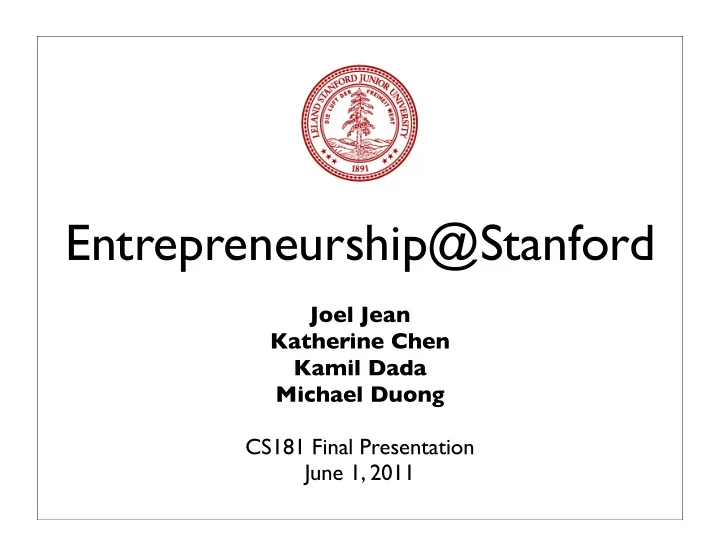

Entrepreneurship@Stanford Joel Jean Katherine Chen Kamil Dada Michael Duong CS181 Final Presentation June 1, 2011
Is there a minimum age for changing the world ?
Topics of Conversation Undergraduate Community Survey Individual Perspectives Key Elements of Entrepreneurship at Stanford
Do you consider yourself entrepreneurial?
“ The Silicon Valley environment drives more people to entrepreneurship than ” anything Stanford does. - Jay Borenstein , CS prof and SSE Labs mentor
“ Stanford is the catalyst and everything else is part of the reaction. - Joachim de Lombaert , SymSys ’09, Co-founder of Friend.ly People here can fail without being ridiculed. - Dan Thompson , CS ’13, Founder of ThinkOutside If you try to teach entrepreneurship in class, it will fail. I think teaching entrepreneurship in class is worthless. - Marty Hu , CS ’11, Co-founder of Tezzit ” I value classes for the network they provide. - Erin Parker , Economics and Math ’11, Co-founder of Bard.li
What resources at Stanford have helped prepare you for entrepreneurship? ETL is the gateway drug to entrepreneurship. - Yin Yin Wu , CS ’11, BASES Co-president, Co-founder of AdRaid
Student groups But I think are a great way Stanford is to meet other going interested about it in students... the wrong way... They all fit a specific niche: STVP, CEO, ASES—they all fit different niches. There wouldn’t be all these different programs if there wasn’t the demand. - Yin Yin Wu ‘11 Stanford would have entrepreneurs without ETL, BASES, - Marty Hu ‘11 ASES, or Mayfield...
Does Stanford focus too much on entrepreneurship at the expense of a classical liberal arts education? A true liberal arts education teaches you the ability to learn anything. - Marty Hu ‘11
“ The problem is that engineering produces graduates who go on to make a lot of money and give back to support those departments, while humanities graduates can’t really hope to make a fortune, even if they have a fantastic - Jay Borenstein ” idea, say, for a book.... Many students just don’t see the value in majoring in the humanities.
“ As a CS major who has no idea about psychology, it’s hard to get your product out there. You think if it’s good they will come, but that’s not the case. - Travis Kiefer, CS ’11, Founder of Gumball Capital Being able to sell is the most important: You need to sell to your co-founders to join you. You need to sell to investors. Liberal arts majors tend to have a better time doing that. - Marty Hu ‘11 If I redid Stanford, I would probably be an English ” major.... There are people who change the world who don’t take Math 53 . - Erin Parker ‘11
If you had a great idea and were offered $100K to work on it for 2 years, would you take it?
If you had just graduated from high school, would you take it over attending college?
“ Is it worth it to disrupt the personal development of a high-schooler in exchange for the early experience of founding a company? I don’t think so. - Jay Borenstein A university education gives the large majority ” the tools to become innovators and entrepreneurs throughout their lives. - Jim Plummer , Dean of Stanford’s School of Engineering
“ Taking the Thiel Fellowship was the easiest decision of my life .... But all the people in college are making the right choice, while people who aren't in college aren't necessarily making the right choice. College is an amazing hiding place: It's the only place you can work on an idea and fail and no one knows. ” - Tom Currier , Physics ’13, Thiel Fellow, Founder of Black Swan Solar
So... What’s the secret ingredient?
Stanford’s Secrets • Flexible leave-of-absence policy • “The best part of Stanford is that you can leave Stanford. Once you're in the family, you're part of the family forever.” - Tom Currier ‘13 • Project-based learning • “You need lots of project classes that allow you to mix the course content with your own ideas while letting you maintain IP rights.” - Joachim de Lombaert ‘09 • Specific entrepreneurship resources (à la SSE Labs, OTL) • “For a university that’s not Stanford in a location that’s not Silicon Valley, making it easy for entrepreneurs to prosper is crucial.” - Jay Borenstein • Forgiving attitude towards failure • The view of failure—that failure isn't final, or fatal—is an important aspect of the culture for an entrepreneurial ecosystem to develop." - Travis Kiefer ‘11 • The best students in the world Questions?
Recommend
More recommend